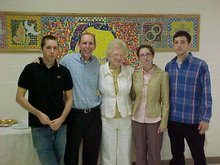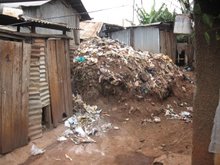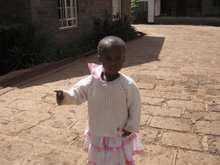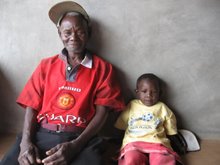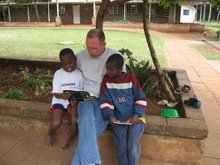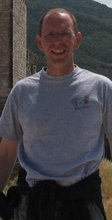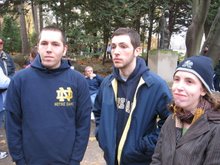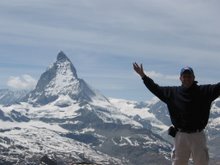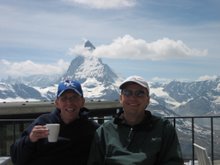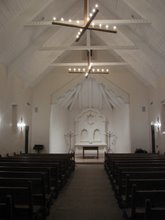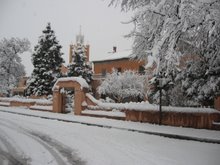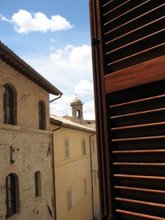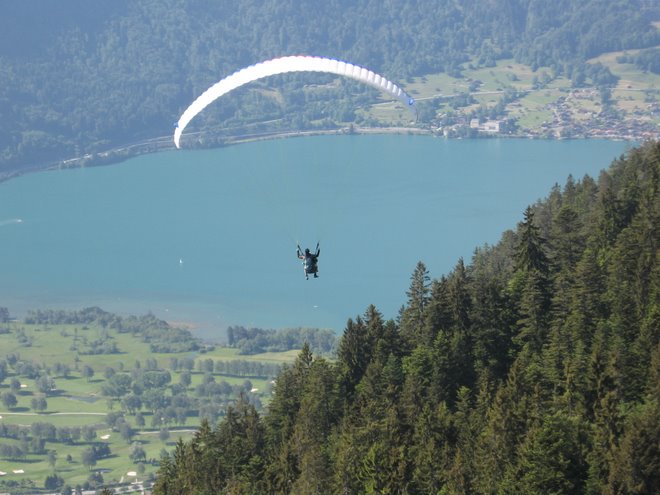Wednesday, October 31, 2007
Thursday Morning in the Mist
I woke early today, hearing the children at the Children's Home getting ready for school and boarding the bus to take them to the local schools. Yesterday there was a Halloween party, some punch and treats and some costumes to celebrate. This morning is cold, foggy, rainy and the children are bundled up with hats, sweaters and sweatshirts. They don't do well in the cold and are usually in sweaters etc, to keep their chests covered and prevent respiratory issues.
Hoping to either go to Don Bosco or the Kibera Slums today. We shall see. Peace!
Childhood
TIA! - THIS IS AFRICA!
I had the opportunity of spending a day in Nairobi with George (Kenyan from the Village) and Maria, a young woman from Spain working on a business plan for the woodworking shop in the Village. We took a Matatu to downtown and ran some errands with George but we were able to see parts of the city that many tourists, especially white tourists, cannot see. We hopped Matatus here and there. They are not permitted to stop or the drivers are ticketed. You have to run along side and jump in the van. There were three of us trying to board so it was quite a sight. I still feel that the driver was playing games - "See if we can make the white guys run!" It was great fun actually. We saw more slums and poor people trying to sell what they had on the streets. Always the smells of burning trash and charcoal. When I first came to Africa, the feeling of despair and sadness filled my mind. There was always a sick feeling that made my head ache whenever I traveled around the town. So much pain, sadness, dirt and grime. But today was different. Although there was the same sad surroundings, being with Maria and George IN AFRICA! made me smile and feel happy to be alive, with them on this great day. We all shared the feelings. You have to meet George. He is hilarious. In his strong African accent he will look at me if I am staring or daydreaming and say things like "Ed, Ed, please come back. Hop on a plane and come back to Africa. Are you at IHM now or somewhere, come back to Kenya Ed and the Village and be with us. Ed, Ed. Are you ok?" Or he'll say "Ed, Ed, when will you return to the Village. It is not the same when you are not in the Village. Come, back and drink a Tuskers, and we'll have a goat, Ed!" George has big responsibilities, making the Village self-sustaining in the next 4 or 5 years. He is in charge of the main farms and the animals. Everything is organic and we picked up organic pesticides, some worm medicines for the goats and other various items around downtown Nairobi. A great day and a great lunch at another Africa restaurant.
Today I visited a Safari company located next door to the Children's Home in Karen, where I am staying. It is my hope to go with George or one of the locals to Masai Mara and Nakuru on a short safari in mid-December. I will be up for another break then.
I miss the kids at the Village. There are plenty of young kids here at the orphanage but it is the Village I have fallen in love with and I told the kids I would return in a few days. I printed out some of their pictures from my camera. They are fascinated by photos, especially of themselves. Photos (and mirrors for that matter) are not usually found at the Village.
Tomorrow we may head to the Don Bosco Vocational School to check on their woodworking shop and school. The Village has some great machinery, old models but very big and good machines. Maria is developing a plan for the shop and info at Don Bosco will help. I also hope to get with Sr. Little and head into Kibera Slums before I go back to the Village sometime this weekend.
That's about it for now. Life in Africa is very good. It is by no means perfect and I still have the same frustrations, disappointments and hurts I experience at home but . . . hey (TIA!) THIS IS AFRICA and I want to concentrate on the great gift this trip is for me. I continue to be SO GRATEFUL.
Sunday, October 28, 2007
Yelling "Fire" in a Crowded Village
Sunday Evening
I also got my hair cut at the BP station! 200 Shillings (less than $3.00) for a smart looking haircut. The barber was Kamba so I got to use my Kamba Language on him. Very cool.
Tomorrow - more relaxing and checking things off my list. I want to check out a Safari for my next break in a couple months. I also want to try to hook up a Blackberry that was given to me. I may be able to email from the village via cell signal. We shall see and it depends on the price. I will also look to update the blog with more journal entries. G'Night!
Picture Site
I hope you can view them. ED
"The Poor Don't Know How To Lose"
The Dreams of Youth
Hindus and Buddhists are way ahead of us Westerners in terms of what their young people idealize. They’re led to idealize holiness, inner freedom, inner truth, rather than simply outer success. Our drive for outer success has given us tremendous advantages in terms of the scientific and industrial revolutions, but Asia and Africa are more able to triumph over the inner world. Wisdom is still idealized as the value that binds them together.
During my travels I was glad to see, in Africa especially, the almost universal puberty rites and initiation rites still in place. Basically they are intense, three-month “CCD programs” that work. The young people are taken apart by the wise men or women of the tribe and taught what wisdom is: “This is what holds us together as a people. This is what we stand for, this is who we are, these are our values.” And when those young men and women return from those kind of groupings, they know who they are.
In our culture, we’re forever searching for our values, what we want to believe in, what we might want to commit ourselves to. Adolescence, the time of open options, now lasts until age thirty-two in the West! In some cultures, adolescence really ends as early as sixteen and seventeen. You often see that in the self-assurance of young people who find their ground and meaning much earlier.
I suspect we actually are stunted and paralyzed by having too many options. We are no longer the developed world; we are the overdeveloped world.
from Letting Go: A Spirituality of Subtraction - Richard Rohr
African Lessons
(Written by Richard Rohr in Africa) The missionaries here love to talk about their peoples. At every meal, I inquire about the ways of the different cultures: the hard-working Kikuyu, the fascinating Masai, the exotic and primitive tribes of Turkana and others. The more I travel, the more it becomes evident that it is culture what finally and firmly forms our attitudes—so deeply that we don’t recognize them as chosen attitudes. It is an emotional seeing that is not easily challenged or overcome. How will God ever make unity out of our extraordinary diversity, especially when each culture is so committed to its own pair of glasses? My best memory from this trip to Africa is the young man who gave me two of his carvings in exchange for my watch. I got the bargain: he gave me himself, his art, and took away a tyrant from my wrist. All I really gave him was my address, since he wanted to write. The poor don’t know how to lose.
from St. Anthony Messenger, “African Journal” Richard Rohr
Saturday, October 27, 2007
A Day in the Life of a Student in Kitui
The students are very motivated to do well and study quite a lot on their own. The goal is secondary school, which for these students, is boarding school. More later - and hopefully pictures.
Quick Update
The library computers are humming along thanks to your donations for the solar unit that is now installed. What a great thing! The students are so excited. They get to school at about 6:45 and wait for me to open the door. I have one grade each morning from 6:50 - 8:15. Students have a break to run some time in between. Everyone runs laps in the morning for exercise and then back to class. There is a pile of shows left in the dirt and they take off in traditional, beautiful Kenyan strides. I have classes in the morning and then pick up the other grades from 3:00 - 4:00. I have also been teaching some English, some Math and had an opportunity to play guitar for some. I continue to tutor Benard (14 yrs) and some others in the evenings. I was able to spend some days working in the shamba, or field, but now spend a great deal of time at school. There are three projects I am working on and attempting to fund.
1.) Baskets - made by the grandmothers to support the orphans in their houses. I'll be shipping 120 baskets to IHM for sale. Thank you!
2.) Solar in the Clinic and Administration Building - With the coming of more children, some who are positive for HIV, comes the needs for refrigeration of medications. I am hoping to equip the building with power for lights and refrigeration ASAP.
3.) Harvesting rain water - I am hoping to make the Guest House, my home, a model for the collection of rain water. It rained the night before last and we believe it is the beginning of the rainy season. The water in the Village is undrinkable for white guys like me. It is high in saline and fluoride. It is also not the best for watering crops. We need to purchase and install gutters, downspouts and a holding tank on each of the 26 houses. The Guest House will be the first.
So - those are my projects and I hope to complete some groundwork here in Nairbobi before I return to the Village.
I'll write much more very soon. I have so much in my head and heart. I want to share it with you - just not today. Today I rest and sleep and thank God for the first 6 weeks in Africa and for you. Peace.
To come:
The rain, the moon, the sunsets, Benard, the goat who gave his life, the fire, the coffin, volunteers from Spain, Australia and Chicago, impromptu dancing and drumming, insects,snakes, etc. Trust me - it is all good.
Monday, October 8, 2007
More pics and return to the Village today






Friends of Nyumbani Website
Sunday, October 7, 2007
Sunday
Life and Death in Nairobi
We were driving Friday to downtown Nairobi to purchase the solar panels when traffic slowed (not unusual). There in the middle of the street was a young man, dead from some type of head trauma. He died alone in the street, no one near him. No one stopped, no cars, no police. It happens all the time in Nairobi, a city known for its violence and death. I will never get over it or understand it. Ken died with love, respect, prayers in the arms of those who had come to love him. Millions die here with no one - in the streets, in the slums, unknown only to their creator. I remain grateful to work in the remote areas, free from such violence and numbness. Sometimes one can only say a prayer and go on.
Saturday, October 6, 2007
From my journal
The Mornings
I wake with the crowing of the roosters at about 5:30. My routine has been to stand at my little window that looks out on the rising sun and praying three prayers: The Daily Office from a book given to me by my Irish friend, a prayer to Divine Providence from the CDP sisters and finally a special prayer I wrote to unite me with my friends. When I rise, they are going to sleep. We pray the same daily/nightly prayer but on different continents.
I open the door to my little house and find Syokwaa starting the fire for the morning tea and breakfast. All the food is cooked on a fire started outside each day. Sometimes the open fire is built in the "kitchen" and so the house is always smoky. Every house has a little fire built outside and they glow each night. Beans and rice are always cooking somewhere.
 The day also begins with a walk to the water. There is a well dug and lines run to spickets throughout the village but often, more times than not, the generator for the pump is not working or turned off to conserve water in the arid land. I walk, like all the other villagers, to get water for washing or a morning "shower". My room has a little side room, or latrine with a hole in the concrete floor. Once you use the bathroom, you sprinkle a cup of ashes (from last nights fire) over it to keep down the smell and the insects. There is also a little space to shower – which is a bucket of water over your head – very cold in the morning, Sometimes I place a bucket of water in the hot sun and have a warmer shower after work. You get use to it all – the shower and the latrine and the bugs. Water is a major issue – finding it, carrying it, drinking it. I drink from big 10 liter bottles of clean water, purchased in Kitui (about and hour and a half away by truck) although I have been drinking some of the local water if it is boiled. It is heavy in saline and fluoride.
The day also begins with a walk to the water. There is a well dug and lines run to spickets throughout the village but often, more times than not, the generator for the pump is not working or turned off to conserve water in the arid land. I walk, like all the other villagers, to get water for washing or a morning "shower". My room has a little side room, or latrine with a hole in the concrete floor. Once you use the bathroom, you sprinkle a cup of ashes (from last nights fire) over it to keep down the smell and the insects. There is also a little space to shower – which is a bucket of water over your head – very cold in the morning, Sometimes I place a bucket of water in the hot sun and have a warmer shower after work. You get use to it all – the shower and the latrine and the bugs. Water is a major issue – finding it, carrying it, drinking it. I drink from big 10 liter bottles of clean water, purchased in Kitui (about and hour and a half away by truck) although I have been drinking some of the local water if it is boiled. It is heavy in saline and fluoride.Food
Food is a variation on a theme. Residents of the Village receive shipments of bags of rice, corn (Maize) and beans. Lunch and dinner are some combination of these. You've seen the big bags from the WFP – World Food Program. At times there is some meat. A cow broke it's leg last week and the village had some meat. It won't keep long – no refrigeration, Ugali is made from maize flour – stiffer than mashed potatoes and not as flavorful. Scuma is the local vegetable grown everywhere, It is not my favorite. Chapati is a flat bread fried in a hot skillet with a few of the meals. Drink is always water. Morning is either bread and butter, cold sweet potatoes but sometimes little cakes or mondazis.
My Work
I have been working at a library space shelving 32 cases of donated books from the U.S. I have divided into Preschool, Lower Primary, Upper Primary and Secondary. There can be no check out, maybe eventually, but the books would never return or return in poor shape. The library has a number of issues, the biggest being the dirt and dust that gets blown in every night. Everything gets a layer of dirt nightly. I purchased some heavy material from the town of Kitui, about an hour away. I sewed, with the help of Agnes, some panels that fit over each shelving unit. The sewing machine is one of about ten here, all pedal run. They make the students' school uniforms here – a smart mint green shirt and light green plaid shorts and jumpers. Eventually I learned the rhythm of the sewing machine pedals. Therr were also ten laptops which were donated and loaded with educational software. The computer issue is the lack of electricity. We are hoping to purchase solar panels – with the help of some donated funds! and therefor be able to light the room at night and power the laptops. The computers run Edubuntu – a software unfamiliar to me but is a version of Lynux as opposed to Windows. We will need to schedule classes for computer use and use of the library books. It is difficult because it "doesn't fit into the national curriculum.
Kamba
The language is a bit of a challenge. IO know just a bit of Swahili – as do some of the locals and many children, but the language spoken here is Kamba, the tribal language of this area and group. I am learning slowly with the help of the staff but especially from the children, They are eager to help me and laugh at my mistakes. Some greetings like "wamukaata", "waja" "uvawaku" are all greetings of a sort and used a lot. Others are much more difficult and the inflection changes everything. Mazungu is the word heard most often around me - "White Guy". I do stick out a little. There are only two of us anywhere near here. The kids stroke my hands because they are soft and pull the hairs on my arms and stroke my beard. All novelties.
Weather – Hot and no chance of rain tonight
The weather is hot and dry – similar to Vegas maybe in the days, quickly cool at night. By noon or 1:00 it is pretty intense. I have no clue how hot it is, no weather report or thermometer. There is almost always a breeze, stirring up the dirt! Most of the time the sky looks like the opening of a Simpson episode or a Windows Screen saver – bright blue with white fluffy clouds. Oh the nights! I have seen a huge full moon night but also the moonless nights where the stars take your breath away. You can see the Milky Way clearly. The only lights you can see are the flicker of fires built next to each of the 25 little houses for cooking. Currently there are about 185 children and 25 grandparents or caregivers. The oldest is 96. Everyone sings and dances – especially at church services and at school. The boys are always dancing and singing and hanging all over each other. Any friends walk hand in hand, arm and arm, no matter if they are boys or girls. It is interesting and catches you eye at first until you get used to the custom. There is never any feelings of being self conscious with physical affection.
Kitui
The trip to Kitui was long in coming. Kitui Town is about an hour (depending on the roads) form the village. It is the largest town anywhere close to the Village. It is only there where we can get supplies like bottled water, PB and J, etc, There are also two old computers in the town but I didn't have time to wait for one or wait for the power to come on. The manager of the village drove to Kitui to get an important email, only to find that the power had gone out. a wasted day's trip. When people hear there is a truck going to Kitui, everyone wants to get on board. we took a flatbed truck in order to pick up some raw wood etc. for a building project. The roads are crap – terrible and the drivers must maneuver like driving in a mine field. All the wood will need to be planed and cut, and dried before use. There is also an ATM, although my friend had his card taken by the machine. We wnt to lunch at a "nice" restaurant – beef chips and "fries" for four people cost about $8.00 US. Tasty after rice and beans and we had a Coke! There is a truck sent to pick us up along with the supplies. I ride in the back of the truck with about eight other locals. I get the points and stares – Mazungu. We stop at a service station and pick up more passengers. By this time I am crowded – sitting on a wooden bench, trying to keep my hat on and my back in alignment. Did I say the roads are crap? We ride for about an hour, headed home until we come to the junction in the road that we turn off for the 30 minute ride on dirt. We stop and squeeze six more people on the truck. A old woman, in her eighties cannot climb onto the truck. She hands me her live chicken, feet tied to hold for her. I can't refuse . Flapping wings and biting at me I hold the chicken she will no doubt kill for dinner tonight. It was quite a ride.
Nairobi for the Weekend
I came to Nairobi yesterday to purchase solar panels for a library project I am working on in the Village of Kitui, about 3 and a half hours from Nairobi. I am also now the Volunteer Coordinator for the Village and am meeting three new volunteers to give them a brief orientation on the Guest House, Kamba tribe, and life in Nyumbani Village. They are from New Guinea, Australia and the US. Know that things are going well - very different with no electricity, plumbing, good water but I am thoroughly enjoying the work and the people. I hope to load part of my journal soon.
I head back to Kitui Sunday night. More to follow!

